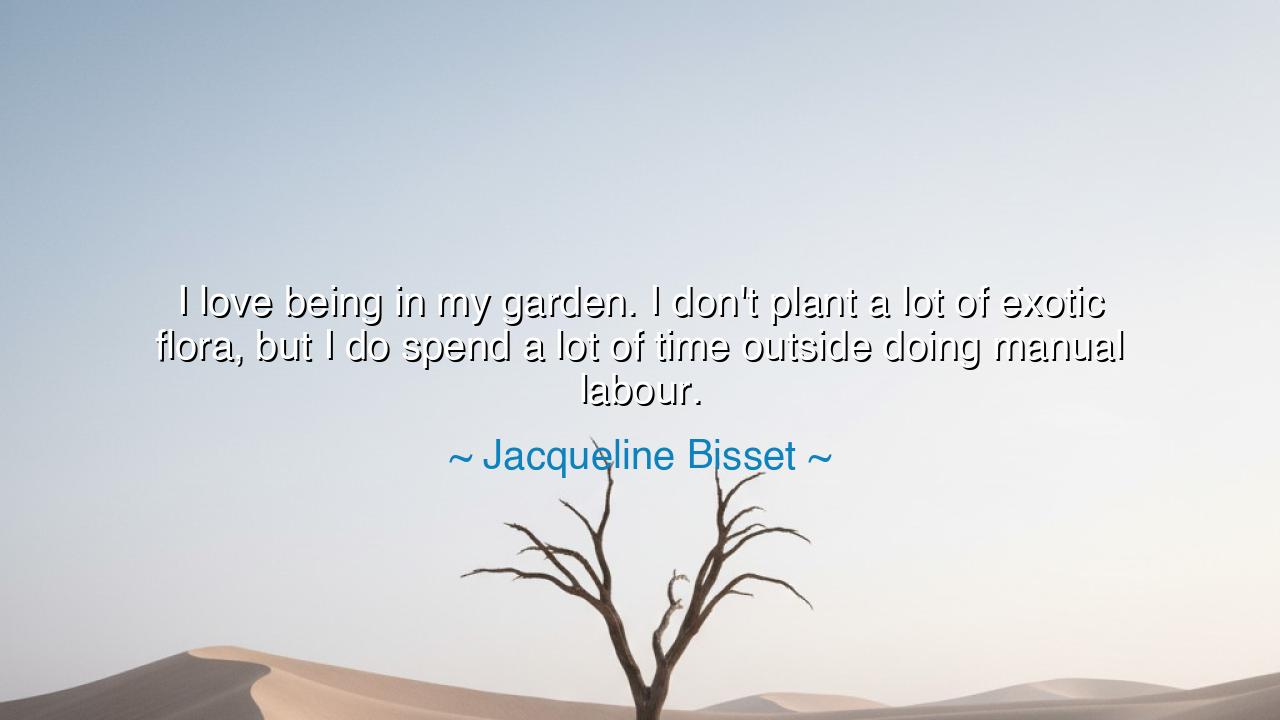
I love being in my garden. I don't plant a lot of exotic flora
I love being in my garden. I don't plant a lot of exotic flora, but I do spend a lot of time outside doing manual labour.






“I love being in my garden. I don’t plant a lot of exotic flora, but I do spend a lot of time outside doing manual labour.” Thus spoke Jacqueline Bisset, the actress of quiet strength and luminous grace, whose words reveal not vanity, but humility — not glamour, but groundedness. In a world enamored with display, she reminds us that life’s richest joys are often found in simplicity, in the steady rhythm of work, and in communion with the earth itself. Her statement is more than a reflection on gardening; it is a meditation on the value of labour, of presence, and of finding beauty not in what dazzles, but in what endures.
The origin of this saying rests in the life of a woman who, though known for elegance and fame, found peace not beneath the lights of the camera, but beneath the open sky. Jacqueline Bisset, a figure of poise and cinematic legacy, reveals through this confession her desire for authenticity — the yearning to touch something real amid the illusions of her profession. By tending to her garden, by shaping it with her own hands, she reclaims a sacred truth that civilization too often forgets: that man and woman were born not to be served, but to serve the living world; not merely to consume beauty, but to create and care for it.
To say, “I don’t plant a lot of exotic flora,” is to express a kind of quiet philosophy. The exotic dazzles the eye, but it is not always native to the soil; it may demand artifice, attention, and control. Yet the simple and the familiar — the plants that belong — grow naturally, harmoniously, without pretense. In this, Bisset teaches us the wisdom of contentment. The ancients too revered such balance. Marcus Aurelius, emperor and philosopher, reminded himself that “what is natural is never base.” So too does Bisset’s garden embody the principle of the Stoics: to live not in extravagance, but in accordance with nature. The true beauty of the garden lies not in its rarity, but in its harmony.
Her love of manual labour further reveals the sacred relationship between the hand and the heart. In an age when machines and servants could easily perform the task, she chooses instead the honest toil of her own strength. This labour is not a burden, but a prayer — a return to humility. The manual act of digging, pruning, and watering connects the body to the rhythm of life itself. The soil receives her effort and responds in kind. In the sweat of work, she rediscovers what all great souls have known: that there is a deep healing in the touch of the earth, that labour, when done with love, becomes a form of worship.
Consider, for a moment, the life of Leo Tolstoy, the Russian novelist who, despite wealth and fame, turned to the peasant’s plough in his later years. He labored in the fields beside simple farmers, believing that through work he could cleanse his soul and return to truth. “There is no greatness where there is no simplicity, goodness, and truth,” he wrote — words that echo in Bisset’s devotion to her garden. Both understood that the act of working with one’s hands brings clarity to the mind and purity to the heart. The earth becomes not just a place of growth, but a teacher, revealing that all beauty requires effort, and all peace requires humility.
There is a quiet heroism in such a life. To spend time outside, beneath the changing skies, is to live as the ancients did — guided by the rhythm of the sun and the whisper of the wind. In such moments, one remembers that the soul, too, is a garden: it must be tended, pruned, and nourished through effort and attention. The weeds of idleness, pride, or distraction must be cleared by hand. The gardener of the earth is also the gardener of the spirit. Bisset’s labour thus becomes a metaphor for inner cultivation — the work of aligning the heart with the natural order of things.
Therefore, my child, learn from Jacqueline Bisset’s quiet wisdom. Do not chase after the exotic — the rare, the foreign, the fleeting — for its beauty fades as quickly as fashion. Cherish instead the familiar, the faithful, the humble joys that root you to your world. When life grows heavy with noise, go to your garden — whatever form it takes — and work with your hands. Feel the soil, the stone, the pulse of life beneath your fingers. In that manual labour, you will find not exhaustion, but restoration; not monotony, but meaning.
For in the end, the greatest art is not that which is performed before others, but that which is done quietly, in harmony with the living earth. As Bisset teaches, the heart finds its noblest strength not in applause, but in effort — in the simple, steadfast act of caring for what grows. Tend your garden, tend your soul, and the world around you will bloom with peace.






AAdministratorAdministrator
Welcome, honored guests. Please leave a comment, we will respond soon